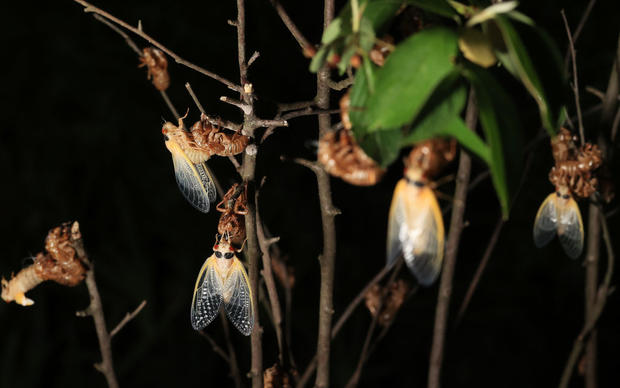Some Marylanders Are Seeing A Cicada Tsunami, While Others Haven't Seen Any, Expert Explains Why
RANDALLSTOWN, Md. (WJZ) -- When it comes to the cicadas they seem to cover some neighborhoods while avoiding others altogether.
In Randallstown, they're so bad some people are changing plans and avoiding going outside all together.
When WJZ's Sean Streicher arrived Monday afternoon it was raining, which seemed to keep the cicadas at bay.
After it stopped and the cicadas came out to play. A tree was covered in cicadas and you can almost understand why some in this neighborhood have decided to stay indoors for now.
Michael Izard just wants to have a barbecue, but there's one little pesky problem standing in the way.
"I don't think now I feel comfortable having people over," Izard said.
He said they started noticing the cicadas a few weeks ago. They now cover his shed and make yard work unbearable.
"I'll tell you what, it's just an uncomfortable itchy feeling," Izard said.
Even his dog, Midnight, is not a fan.
"They start making this buzzing sound and everything," Izard said. "She hates it and she's very uncomfortable with it."
But while he battles these bugs on a daily basis, other areas seem to have avoided the infestation.
"In some places you're going to have a lot of cicadas and then you can go three doors down and you got no cicadas," said Dr. Mike Raupp.
Raupp, better known as "The Bug Guy" with the University of Maryland, said there's a few reasons why.
"It will depend on number one, where those cicadas decided to lay their eggs, which tree 17 years ago, and number two, if there's been changes in the land use patterns," Raupp said. "For example, regarding construction, building impervious surfaces, patios decks over the roots of those trees or taking down those trees, you're simply not going to have periodical cicadas."
That's why newer developments seem to be shielded from the cicadas. Unfortunately, for Izard his house was built nearly 60 years ago. He's just hoping he'll be able to have that BBQ soon.
"We're hoping to maybe have people over for the Fourth of July instead," he said.
It seems like the Fourth of July will be doable.
Right now, Maryland is in the peak of the cicada tsunami. They should start to fade out towards the middle of June and hopefully they'll be gone by July.




